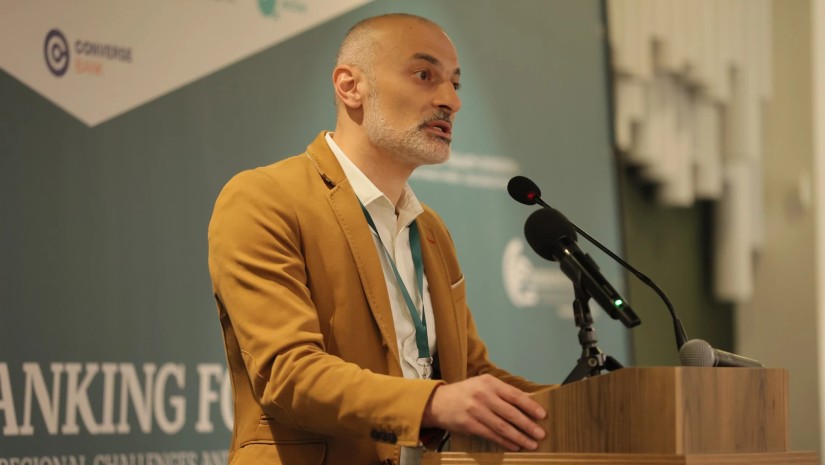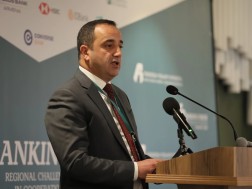In an exclusive interview with BMG at the recent international banking forum held on November 7 in Yerevan, Levan Gogoladze, ESG and Sustainable Finance Coordinator at the Georgian Banking Association, shared insights into his presentation at the forum, emphasizing the importance of collaboration with Armenia and Europe on sustainable finance. Gogoladze also discussed the current challenges posed by sanctions, as well as his expectations for Bank of Georgia's recent investment in Armenia's Ameriabank.
Mr. Gogoladze, presenting the banking system of Georgia at this banking forum in Yerevan, what did you focus on?
First of all, this forum truly creates a wonderful opportunity for us, as regional and European institutions, to come together, sit, and discuss challenges and opportunities for strengthening our financial systems and enhancing cooperation with European financial markets and frameworks. We initiated active collaboration with the Union of Banks of Armenia by signing a memorandum of cooperation this December, and we already see results, as we are here, very glad and pleased to be part of this event, to share our experiences, and to learn from others. Specifically addressing your question, we brought our experience in sustainable finance, as Georgia has progressed somewhat further than other countries in the region in this area. Hearing our experiences is interesting for various organizations, commercial banks, advisory firms, and others. I presented on the development of sustainable finance in the Georgian market, describing how the regulatory framework has been implemented and discussing milestones achieved over the past 7-8 years since we began working in this field.
What makes Georgia's banking system attractive, and what advantages does it currently offer as a regional model?
Well, I believe that Georgia's banking sector is highly developed, even exceeding the level of development of other economic sectors in various aspects. Customers have access to very modern products, with our commercial banks leading globally in digitalization, providing advanced solutions for customers through mobile banking and other digital services. The numbers are also impressive, and when we look at how our banking sector is progressing, we see similarities with the trends and results in other financial and non-financial sectors. In terms of ESG and sustainable finance, we are indeed a bit ahead, which is why this regional cooperation provides an excellent opportunity for sharing experiences.
What are the similarities and differences between the Armenian and Georgian banking systems?
One similarity is the market size; there’s not a significant difference. Also, the currency structure of deposits and loan portfolios is similar. It’s interesting to note that the concentration level among the top five banks in Armenia is smaller, which is good. In Georgia, two major banks hold almost 70% of the market share, which doesn’t mean there is no competition, but in Armenia, there’s more diversity in asset distribution among banks. In terms of profitability, the numbers are also similar, and the number of banks in each sector is comparable.
Currently, with the growing international sanctions against Russia, which has economic ties to Armenia and Georgia, it has become quite challenging for the banking system to operate effectively. On one hand, banks must support the needs of their respective economies; on the other, they need to operate in ways that avoid potential sanctions. How effectively are our banks managing this challenge?
Yes, it is indeed a very challenging time. I fully agree that, from the perspective of sanctions and AML (Anti-Money Laundering) requirements, banks are facing considerable pressures. In our country, we see that every transaction is carefully monitored by specific departments within commercial banks to avoid risky transactions. It’s genuinely a tough time, requiring significant oversight and control over all operations.
However, thus far, we have managed quite successfully, and I believe the same can be said for Armenia. It is also essential that we have the potential for cooperation between our central banks and commercial banks to jointly address these issues. Engaging in discussions about the European financial market and system and cooperating with them is already a meaningful step toward a solution. I believe our future is closely linked with the EU, and this forum is a very positive sign of that direction—both in its title and in the distinguished guests who are here with us. This is an excellent development.
Last question. Recently, the largest Georgian bank, Bank of Georgia, entered the Armenian market, becoming the main shareholder of one of Armenia’s largest banks, Ameriabank. What are your expectations for this investment?
Yes, I believe this is an excellent example of how, at the regional level, banking sectors can collaborate successfully. I think the investors made a very wise decision with this deal, especially since the Bank of Georgia is one of the leading institutions in our region. As you may know, they are listed on the London Stock Exchange, and this year they achieved first place in the global ranking for digital products—an incredible accomplishment.
I expect that the Bank of Georgia’s extensive experience in developing banking products will benefit the Armenian banking sector, bringing innovative digital solutions that enhance customer satisfaction. I foresee a future where Armenian customers of Ameriabank enjoy a better range of digital products and solutions that meet their needs and improve their overall banking experience.























